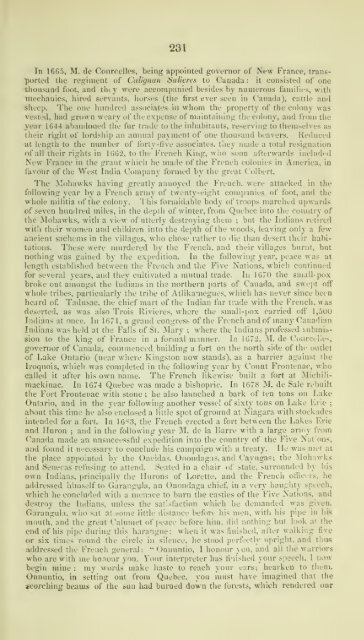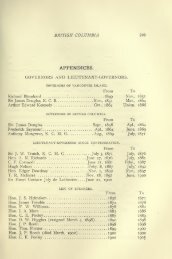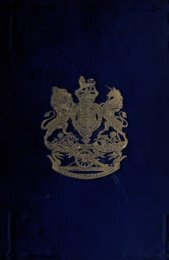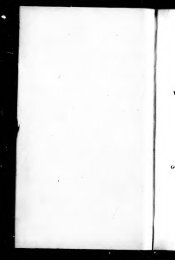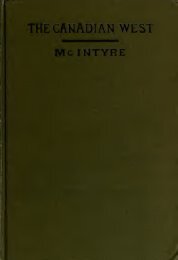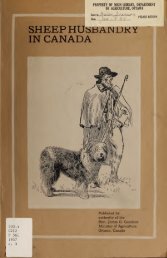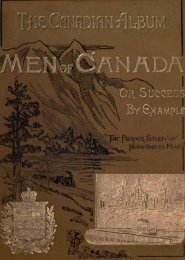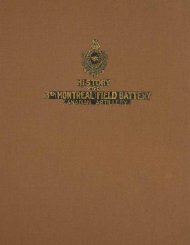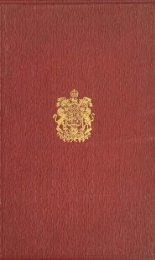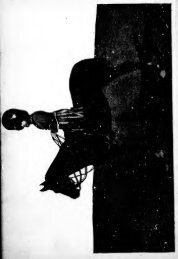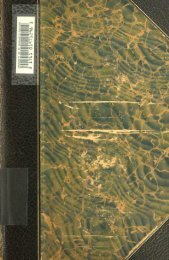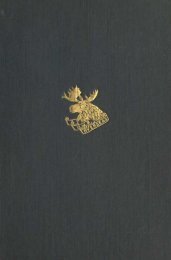Smith's Canadian gazetteer - ElectricCanadian.com
Smith's Canadian gazetteer - ElectricCanadian.com
Smith's Canadian gazetteer - ElectricCanadian.com
Create successful ePaper yourself
Turn your PDF publications into a flip-book with our unique Google optimized e-Paper software.
231<br />
In 1665, M. de Ooiircelles, being appointed governor of New France, transported<br />
the regiment of Calignan iiulicrcs to (.'unada : it consisted of one<br />
thousand foot, and thiy were ac<strong>com</strong>panied besides by numerous families, with<br />
mechanics, hired servants, horses (tiie first ever seen in Canada), cattle and<br />
sheep. The one hundred associates in whom the property of the colony was<br />
vested, had grown weary of the expense of maintaining the colony, and I'roni the<br />
year 1644 abandoned the fur trade to the inhabitants, reserving to themselves as<br />
their right of lordshij) an annual payment of one thousantl l)eavers. Reduced<br />
at length to tiie number of forty-five associates, they made a total resignation<br />
of all their rights in 1662, to the French King, who socm afterwards included<br />
New France in the grant which he made of the French colonies in America, in<br />
favour of the West India Company formed by the great Colbert.<br />
The Mohawks having greatly annoyed the French, were attacked in the<br />
following year by a Frencli army of twenty-eight <strong>com</strong>panies of foot, and the<br />
whole militia of the colony. This formidable body of troops marclied upwards<br />
of seven hundred miles, in the deptli of winter, from Quebec into tlie country of<br />
the Moliawks, with a view of utterly destroying them ; but the Indians retired<br />
^vith their women and children into the depth of the woods, leaving only a few<br />
ancient sachems in the villages, who chose rather to die than desert their habitations.<br />
These were murdered by the French, and their villages burnt, but<br />
nothing was gained by the expedition. In the following year, peace was at<br />
length established between the French and the Five Nations, which continued<br />
for several years, and they cultivated a mutual trade. In 1670 the small-pox<br />
broke out amongst the Indians in the northern parts of Canada, and swept off<br />
whole tribes, particularly the tribe of AtlikaTuegues, which has never since been<br />
heard of. Tadusac, the chief mart of the Indian fur trade with the French, was<br />
deserted, as was also Trois Rivieres, where the smali-pox carried off 1,500<br />
Indians at once. In 1671, a grand congress of tbe French andof many <strong>Canadian</strong><br />
Indians was held at the Falls of St. Mary ; where the Indians professed submission<br />
to the king of France in a formal m inner. In 1672, M. de Courcclles,<br />
governor of Canada, conuuenced building a fort on the north side of tlu' outlet<br />
of Lake Ontario (near where Kingston now stands), as a barrier against the<br />
Iroquois, whicli was <strong>com</strong>pleted in the following year by Count Frontenac, who<br />
called it after his own name. The French likewise built a fort at Michilimackiuac.<br />
In 1674 Quebec was made a bishopric. In 1678 M. de Sale rebuilt<br />
the Fort Frontenac with stone ; he also launched a bark of ten tons on Lake<br />
Ontario, and in the year following another vessel of sixty tons on Lake Erie ;<br />
about this time he also enclosed a little spot of ground at Niagara with stockades<br />
intended for a fort. In le^^S, the French erected a fort between the Lakes Erie<br />
and Hui'on ; and in the following year M. de la Barre with a large army from<br />
Canada made an unsuccessful expedition into the country of the Five Nations,<br />
and found it necessary to conclude his campaign with a treaty. He was met at<br />
the place appointed by the Oneidas. Onondagas, and Cayugas; the Moh:iwks<br />
and Senecas refusing to attend. Seated in a chair of state, surrounded by his<br />
own Indians, principally the Hurons of Lorette, and the French officers, he<br />
addressed himself to Garatigula, an Onondaga chief, in a very haughty speech,<br />
which he concluded with a menace to burn the castles of the Five Nations, and<br />
destroy the Indians, unless the satisfaction which he demanded was given.<br />
Garangula, who sat at some litth; distance before his men, with his pipe in his<br />
mouth, and the great Calumet of peace before him, did nothing but look at the<br />
end of his pipe during this harangue: when it was finished, after walkir.g fis'e<br />
or six times round the circle in silence, he stood perfectly upright, and thus<br />
addressed the Freach general: " Onnuntio, I honour you, and all the warriors<br />
who are vcith me ho:H)ur you. Your interpreter has finished your speech, I now<br />
begin mine : my words make haste to reach your ears; hearken to them.<br />
Onnuntio, in setting out from Quebec, you must have imagined that the<br />
scorching beams of the sun had burned down the forests, which rendered our


